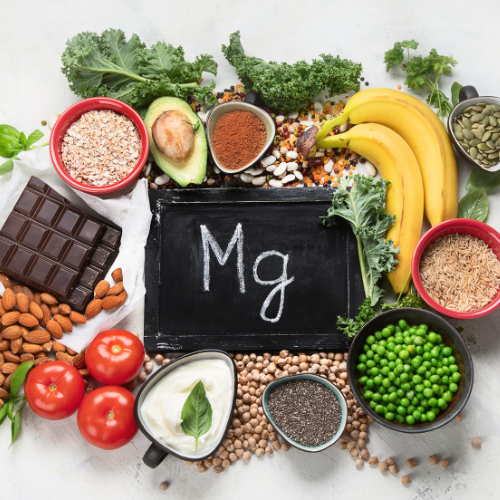Magnesium is an essential mineral that plays a crucial role in numerous bodily functions. It is involved in energy production, muscle contraction, nerve function, and the maintenance of strong bones. While a whole foods, balanced diet should be the primary source of magnesium, supplements can help bridge the gap for those who struggle to meet their daily requirements.
Magnesium can help raise adiponectin levels (a hormone involved in metabolism) and reduce inflammation, which is key for hormonal balance. Increase your magnesium intake either through food sources like pumpkin seeds, spinach, dark chocolate, or by taking a quality supplement. I share our favourite magnesium supplements at the end of this blog post.
In todays blog we will explore eight different types of magnesium supplements and delve into their specific benefits in promoting overall health and well-being.1
1. Magnesium Glycinate
Magnesium glycinate is a chelated form of magnesium that is highly absorbable and gentle on the stomach. It is formed by bonding magnesium with the amino acid glycine. This combination provides a calming effect, making magnesium glycinate a popular choice for managing stress, anxiety, and promoting restful sleep. It also supports muscle relaxation, helps maintain healthy bone density, and may aid in reducing muscle pain and tension.
2. Magnesium Oxide
Magnesium oxide is a widely available and cost-effective form of magnesium supplement. While it has a lower absorption rate compared to other types, it can still provide benefits when taken in higher doses. Magnesium oxide is commonly used to relieve occasional constipation due to its stool-softening properties. However, it is important to note that individuals with digestive issues may experience a laxative effect at lower doses. It is advisable to consult with a healthcare professional before using magnesium oxide as a supplement.
3. Magnesium Malate
Magnesium malate is a combination of magnesium and malic acid. Malic acid is known for its potential to support energy production, making this type of magnesium beneficial for individuals seeking to combat fatigue and promote vitality. Magnesium malate is also believed to help alleviate muscle pain and promote healthy muscle function. It is often recommended for those with fibromyalgia due to its potential analgesic effects.
4. Magnesium Taurate & Orotate
Magnesium taurate is formed by bonding magnesium with the amino acid taurine. This combination offers cardiovascular benefits by supporting healthy blood pressure and promoting proper heart function. Taurine itself has been shown to have calming properties and may help regulate stress and anxiety. Magnesium taurate is an excellent choice for individuals looking to support heart health while also seeking relaxation and stress management.
Magnesium orotate is known for its high bioavailability, meaning it is easily absorbed by the body. This form of magnesium is often used as a dietary supplement to support heart health, improve athletic performance, and promote overall well-being.
Some of the potential benefits of magnesium orotate may include:
1. Heart Health: Magnesium is essential for maintaining a healthy heart rhythm and blood pressure. Magnesium orotate has been studied for its potential to support cardiovascular health and reduce the risk of heart-related issues.
2. Athletic Performance: Some studies suggest that magnesium orotate may improve exercise performance and endurance by supporting energy production and reducing muscle fatigue.
3. Stress and Anxiety: Magnesium plays a role in regulating neurotransmitters that influence mood, and magnesium orotate may have a calming effect, helping to reduce stress and anxiety.
4. Bone Health: Magnesium is essential for bone formation and maintenance. Magnesium orotate may contribute to better bone density and help prevent osteoporosis.
5. Magnesium Threonate
Magnesium threonate is a newer form of magnesium supplement that has gained attention for its potential cognitive benefits. It has a unique ability to cross the blood-brain barrier, allowing for increased magnesium levels in the brain. Preliminary research suggests that magnesium threonate may support cognitive function, enhance memory, and aid in age-related cognitive decline. It is a promising option for individuals seeking to promote brain health and mental sharpness.
6. Magnesium Chloride
Magnesium chloride is often used in topical applications, such as oils, lotions, and sprays. Applied directly to the skin, it can be absorbed transdermally, bypassing the digestive system. This form of magnesium is known for its quick absorption and may provide relief from muscle cramps, spasms, and tension when applied topically. It is also believed to support relaxation and improve sleep quality.
7. Magnesium Carbonate
Magnesium carbonate is a less common form of magnesium supplement. It is often used as an antacid to relieve symptoms of heartburn and indigestion. While magnesium carbonate provides magnesium, it is not as readily absorbed by the body compared to other forms. However, it can still offer some benefits in supporting digestive health and relieving acid reflux symptoms.
Magnesium is a vital mineral that contributes to various aspects of our health. The different types of magnesium supplements, including magnesium citrate, magnesium glycinate, magnesium oxide, magnesium malate, magnesium taurate, magnesium threonate, magnesium chloride, and magnesium carbonate, offer unique benefits to cater to individual needs. Whether you seek relief from constipation, relaxation and stress management, improved cognitive function, cardiovascular support, or muscle pain relief, there is a magnesium type that can address your specific concerns.
8. Magnesium Citrate
Magnesium citrate is one of the most widely used forms of magnesium supplements. It is highly bioavailable, meaning it is efficiently absorbed by the body. This type of magnesium is known for its gentle laxative effect, making it useful for relieving constipation. Additionally, this popular type of magnesium is used most frequently to keep users regular. While it does ease constipation, the way in which it does it isn’t the best for us. Mag citrate actually pulls water into your intestines, which can lead to dehydration. What’s worse, this type of magnesium can reduce ceroplasmin levels, leading to mineral imbalances and deficiencies.
Our favourite magnesium supplements:
Smidge Morning Magnesium: Smidge Morning Magnesium is a balanced formula that includes three naturally-derived forms of the essential mineral magnesium — with no fillers, synthetic additives or preservatives. Morning magnesium contains magnesium malate, taurinate and rotate. {HERE} Code Roxanne 10
Smidge Evening Magnesium:
Smidge Evening Magnesium is a gentle, calming supplement made with a premium form of magnesium called glycinate complex.
All-natural and easily absorbed, Evening Magnesium helps you relax, sleep and wake up the next morning feeling refreshed — not groggy and foggy-headed, like with commercial sleep aids. {HERE} Code Roxanne10
And unlike other magnesium supplements for sleep, our formula is super clean and made in small batches. This means no common allergens and additives that might interfere with a restful slumber and digestion. Plus, it doesn’t include magnesium citrate, which may cause gastric upset, or magnesium oxide by itself, which is difficult to absorb.
Earthley Goodnight Magnesium Lotion: HERE
Cymbiotika Magnesium L-Threonate: Cymbiotika’s Liposomal Magnesium L-Threonate was developed by a team of scientists at MIT which has been shown to increase brain magnesium levels much higher than any other form of magnesium. Magnesium is an essential mineral that is required for 80% of the body’s metabolic functions. In the United States, approximately 65% of all adults are magnesium deficient. Magnesium deficiency contributes to many chronic conditions including heart disease and loss of cognitive function. {HERE}
MitoLife MAG ATP: HERE
What whole foods are great sources of magnesium?
Many whole foods are excellent sources of magnesium, and incorporating them into your diet can help ensure you meet your daily magnesium needs. We focus on locally grown or organic whenever we can. Here are some magnesium-rich whole foods:
- Organic Leafy Green Vegetables: Spinach, kale, Swiss chard, and collard greens are all rich sources of magnesium. These nutrient-packed greens are not only great for magnesium but also provide other essential vitamins and minerals.
- Organic Free Range Eggs.
- Organic Nuts and Seeds: Almonds, cashews, peanuts, pumpkin seeds, and sunflower seeds are all high in magnesium. Snacking on these nuts and seeds or adding them to salads and yogurt can boost your magnesium intake.
- Organic Legumes: Beans and lentils, such as black beans, chickpeas, and lentils, are significant sources of magnesium. They are also rich in fiber and protein, making them a nutritious addition to your meals.
- Organic Whole Grains: Whole grains like brown rice, quinoa, oats, and whole wheat contain substantial amounts of magnesium. Opt for whole grains instead of refined grains to maximize your magnesium intake.
- Avocado: This creamy fruit is not only delicious but also a good source of magnesium. Enjoy it in salads, smoothies, or as a spread on whole-grain toast.
- Wild Fatty Fish: Fish such as salmon, mackerel, and halibut are rich in magnesium and offer other health benefits like omega-3 fatty acids.
- Real Dark Chocolate: Good news for chocolate lovers! Dark chocolate (at least 70% cocoa) contains magnesium, so enjoy it in moderation as a delightful treat.
- Organic Bananas: Bananas are not only a convenient and tasty snack but also a decent source of magnesium.
- Organic Dairy Products: Dairy foods like yogurt, milk, and cheese contain magnesium. Opt for raw options for a healthier choice.
- Oysters: Oysters are a type of shellfish that are highly nutritious and known for their rich mineral content, including magnesium. They are particularly abundant in certain varieties, such as Pacific oysters and Eastern oysters.
- Organic, Grass Fed Beef: Beef is a great source of magnesium and other organic meats.
- Raw Butter.
- Organic Tofu: Tofu, made from soybeans, is a versatile plant-based source of magnesium, making it an excellent option for vegetarians and vegans.
Remember, while these whole foods are rich in magnesium, their actual magnesium content can vary depending on factors such as soil quality and growing conditions. A balanced and varied diet that includes a mix of these magnesium-rich foods can help ensure you meet your daily magnesium requirements. If you have specific dietary restrictions or concerns, consider consulting a registered dietitian or healthcare professional for personalized nutrition advice.
We hope you enjoyed learning more about magnesium today!
Roxanne xo


